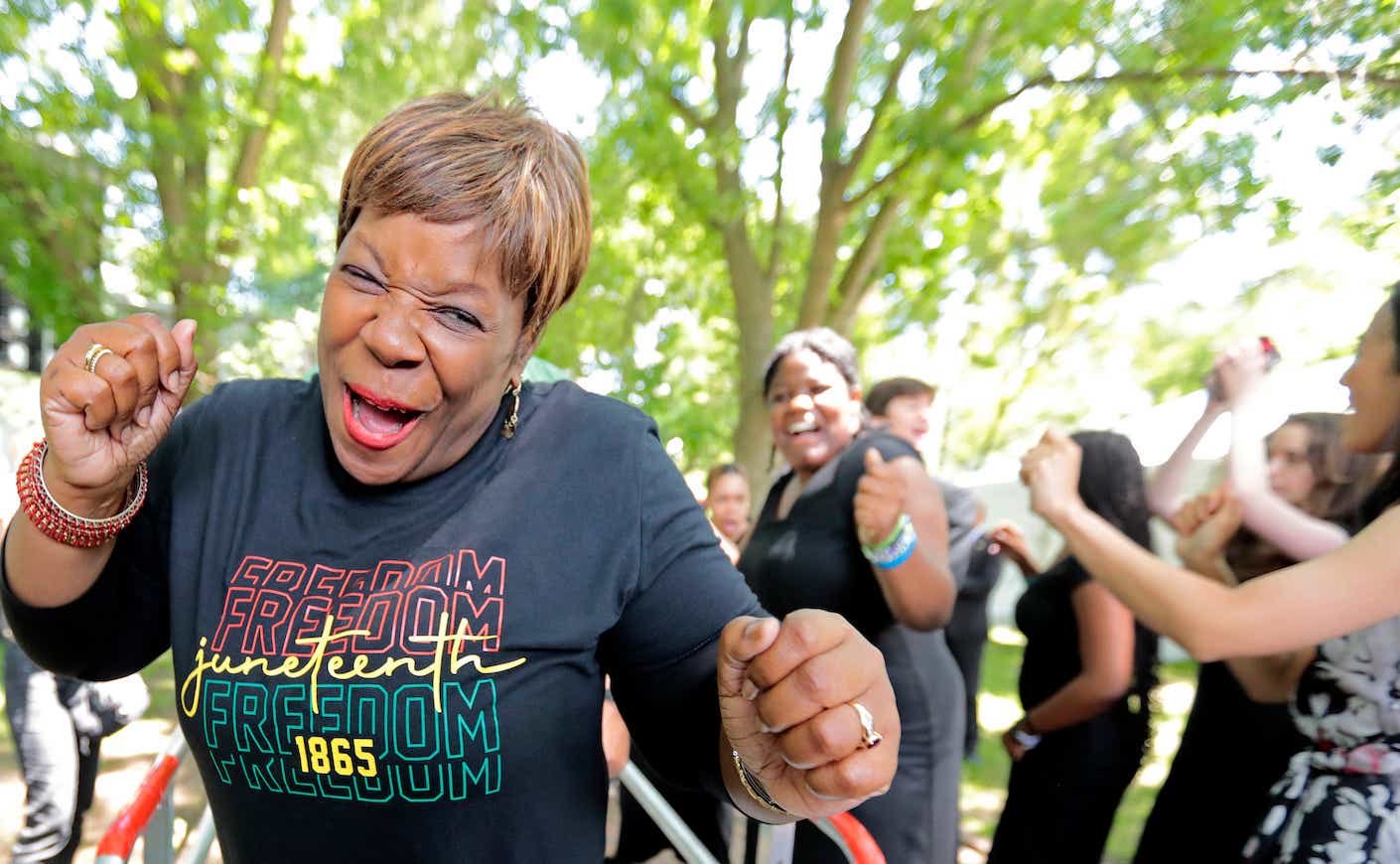Here’s how to turn your good intentions into actual action.
Many of the annual commemorative days on our calendars serve as reminders to “honor” some historical person or event. But Juneteenth is different: To me, a Black woman who’s a descendant of enslaved Black people, June 19 is about more than commemoration, especially for white people. It’s a day to commit to Black liberation and take action, and I’m here to outline how.
June 19 marks the emancipation of African-American slaves in 1865, and it serves as a chance to acknowledge and appreciate those whose lives were destroyed by the brutality of slavery. It’s also a time to honor those who resisted — and gave us a blueprint for our continued resistance against systems of oppression through protest, education, community organizing, legislation, and more. But Black folks aren’t a monolith, and Juneteenth can have different meanings to many of us. For me, Juneteenth is about acknowledging the day when enslaved Black people, who had already been legally freed two years prior, were granted their “freedom.”
I say freedom in quotations because the pain that our ancestors endured didn’t end on June 19, 1865 — it just evolved. Soon after, Black folks faced vagrancy laws, the Jim Crow era, continued unfair labor through exploitative work-leasing contracts, redlining, massacres in Black communities like Black Wall Street in Tulsa, continued abusive medical experimentation, continued lynchings, police brutality, and unfortunately, so much more. Much of what our ancestors resisted even continues today, through evolving systems of oppression like mass incarceration.
The abolition of slavery was just the beginning of the much-needed liberation work that we carry on today.
And because of this, it’s important that we honor Juneteenth by committing to the work of anti-racism work toward Black liberation, which ensures we can all live freely and fully in our humanity. To truly acknowledge the suffering that our ancestors endured and honor their fight for freedom, we have to continue that fight.
For Black folks, Juneteenth can be a celebration, it can also be a day of rest. But for non-Black people, especially white people, this isn’t a day of leisure, even if you have the day off: It should be a day of service. If you’re not sure how to commemorate this day respectfully, here are a few suggestions.
1. Do your own research: Learn about Black liberation. The Shine Bright School has many classes and resources that help folks commit to this work — You can join our membership community and get help building a daily practice of anti-racism for liberation. This month, we’re featuring the Pursue Black Liberation challenge, which begins on the 19th to signify that this work goes beyond Juneteenth. The challenge helps people build a lifelong, daily practice with a workbook that features 21 days of prompts and activities to explore, in order to build a commitment to anti-racism.
2. Commit at work: If you’re in a decision-making role for a corporation, foundation, or brand, use this time to investigate your policies around pay and how you support Black employees. Take some steps toward establishing equitable pay practices and putting systems in place to not only hire Black employees, but support them long after they’ve been hired. Most importantly, follow through on your efforts after June 19.
3. Involve kids: If you’re a parent or work with children, be sure to help them understand why Juneteenth is important, and equip them with skills to commit to this work. Our Black Liberated Parenting course shows you how to teach children to identify racism and be courageous to call it out. Encourage them to be curious about their environment and look for ways to be a part of solutions, such as learning about different cultures, to be more aware and respectful. It’s important to help kids learn that these systems of oppression were here far before them but that change is possible — give them hope that they can build a better future. You can expose them to anti-racist work by following platforms like Conscious Kid, and getting them involved in local organizations where they can learn and practice community building.
4. Use your time and money: Juneteenth is the perfect opportunity to create a plan to redistribute some of your resources. If you’re non-Black and receiving paid time off for Juneteenth, donate the money you made that day to places supporting Black liberation or local Black-led organizations. And find out about ways to get involved long-term with these organizations, whether it’s volunteering your time, money, resources, skills, or connections. That way, their efforts can be more effective and sustainable.
Yes, all of these suggestions require action that goes beyond what’s convenient and comfortable. That’s because honoring Juneteenth must go beyond just understanding the history and reach into the present, committing toward creating a liberated future for all.








